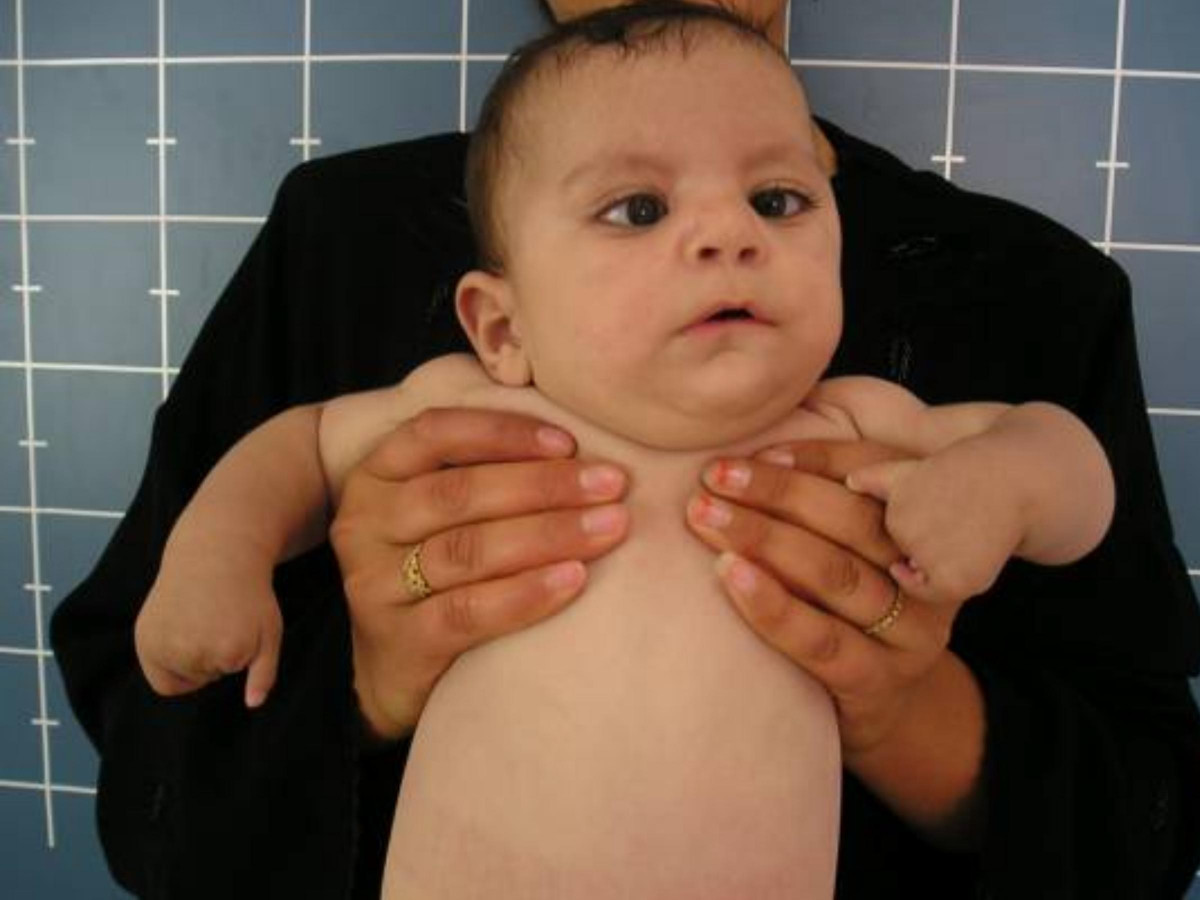Hanhart syndrome
Editor-In-Chief: Prab R Tumpati, MD
Obesity, Sleep & Internal medicine
Founder, WikiMD Wellnesspedia &
W8MD medical weight loss NYC and sleep center NYC
| Hanhart syndrome | |
|---|---|

| |
| Synonyms | Aglossia-adactylia syndrome, Peromelia with micrognathia and microglossia |
| Pronounce | N/A |
| Specialty | N/A |
| Symptoms | Hypoglossia, hypodactylia, micrognathia, cleft palate |
| Complications | Feeding difficulties, speech difficulties |
| Onset | Congenital |
| Duration | Lifelong |
| Types | N/A |
| Causes | Genetic mutation |
| Risks | Family history |
| Diagnosis | Clinical examination, genetic testing |
| Differential diagnosis | Moebius syndrome, oromandibular limb hypogenesis syndrome |
| Prevention | N/A |
| Treatment | Supportive care, surgical intervention |
| Medication | N/A |
| Prognosis | Variable |
| Frequency | Rare |
| Deaths | N/A |
A rare congenital disorder affecting limb and craniofacial development
Hanhart syndrome is a rare congenital disorder characterized by limb and craniofacial abnormalities. It is a type of oromandibular limb hypogenesis syndrome, which involves underdevelopment of the mouth, jaw, and limbs. The condition is named after the German physician Egon Hanhart, who first described it in the 1950s.
Presentation
Individuals with Hanhart syndrome typically present with a combination of micrognathia (small jaw), glossoptosis (downward displacement or retraction of the tongue), and limb defects. The limb defects can vary significantly in severity and may include hypoplasia or aplasia of the fingers, toes, hands, or feet. In some cases, individuals may have syndactyly (fusion of fingers or toes) or polydactyly (extra fingers or toes).
Etiology
The exact cause of Hanhart syndrome is not well understood. It is believed to be a genetic disorder, although the specific genetic mutations involved have not been definitively identified. Some cases have been associated with chromosomal abnormalities, but these are not consistent across all individuals with the syndrome.
Diagnosis
Diagnosis of Hanhart syndrome is primarily based on clinical examination and the identification of characteristic physical features. Prenatal diagnosis may be possible through ultrasound if limb and craniofacial abnormalities are detected. Genetic testing may be used to rule out other conditions with similar presentations.
Management
Management of Hanhart syndrome is typically supportive and symptomatic. Surgical interventions may be necessary to address significant limb deformities or craniofacial abnormalities. Speech therapy and occupational therapy can be beneficial in improving functional outcomes and quality of life. Multidisciplinary care involving pediatricians, geneticists, orthopedic surgeons, and other specialists is often required.
Prognosis
The prognosis for individuals with Hanhart syndrome varies depending on the severity of the abnormalities and the presence of any associated complications. Early intervention and comprehensive management can improve outcomes and help individuals achieve a better quality of life.
See also
Transform your life with W8MD's budget GLP-1 injections from $125.
W8MD offers a medical weight loss program to lose weight in Philadelphia. Our physician-supervised medical weight loss provides:
- Most insurances accepted or discounted self-pay rates. We will obtain insurance prior authorizations if needed.
- Generic GLP1 weight loss injections from $125 for the starting dose.
- Also offer prescription weight loss medications including Phentermine, Qsymia, Diethylpropion, Contrave etc.
NYC weight loss doctor appointments
Start your NYC weight loss journey today at our NYC medical weight loss and Philadelphia medical weight loss clinics.
- Call 718-946-5500 to lose weight in NYC or for medical weight loss in Philadelphia 215-676-2334.
- Tags:NYC medical weight loss, Philadelphia lose weight Zepbound NYC, Budget GLP1 weight loss injections, Wegovy Philadelphia, Wegovy NYC, Philadelphia medical weight loss, Brookly weight loss and Wegovy NYC
|
WikiMD's Wellness Encyclopedia |
| Let Food Be Thy Medicine Medicine Thy Food - Hippocrates |
Medical Disclaimer: WikiMD is not a substitute for professional medical advice. The information on WikiMD is provided as an information resource only, may be incorrect, outdated or misleading, and is not to be used or relied on for any diagnostic or treatment purposes. Please consult your health care provider before making any healthcare decisions or for guidance about a specific medical condition. WikiMD expressly disclaims responsibility, and shall have no liability, for any damages, loss, injury, or liability whatsoever suffered as a result of your reliance on the information contained in this site. By visiting this site you agree to the foregoing terms and conditions, which may from time to time be changed or supplemented by WikiMD. If you do not agree to the foregoing terms and conditions, you should not enter or use this site. See full disclaimer.
Credits:Most images are courtesy of Wikimedia commons, and templates, categories Wikipedia, licensed under CC BY SA or similar.
Translate this page: - East Asian
中文,
日本,
한국어,
South Asian
हिन्दी,
தமிழ்,
తెలుగు,
Urdu,
ಕನ್ನಡ,
Southeast Asian
Indonesian,
Vietnamese,
Thai,
မြန်မာဘာသာ,
বাংলা
European
español,
Deutsch,
français,
Greek,
português do Brasil,
polski,
română,
русский,
Nederlands,
norsk,
svenska,
suomi,
Italian
Middle Eastern & African
عربى,
Turkish,
Persian,
Hebrew,
Afrikaans,
isiZulu,
Kiswahili,
Other
Bulgarian,
Hungarian,
Czech,
Swedish,
മലയാളം,
मराठी,
ਪੰਜਾਬੀ,
ગુજરાતી,
Portuguese,
Ukrainian
Contributors: Deepika vegiraju, Prab R. Tumpati, MD

